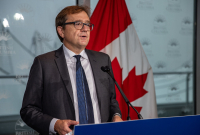Support strong Canadian climate journalism for 2025
Energy and Natural Resources Minister Jonathan Wilkinson isn’t ruling out legal action against Saskatchewan, as the Prairie province confirms it intends to break federal carbon price laws.
On Thursday, Dustin Duncan, the minister responsible for SaskEnergy, confirmed the province does not intend to pay the federal carbon price levy it owes Ottawa. He said the province’s decision to direct Crown utility SaskEnergy to stop collecting the carbon tax from customers was to offer relief to families following the federal government’s carbon price exemption on home heating oil, predominantly used in Atlantic Canada.
When Prime Minister Justin Trudeau announced the home heating oil carveout, premiers from across the country including Ontario, Alberta, Nova Scotia, New Brunswick and Manitoba all began angling for their own exemptions.
However, Saskatchewan Premier Scott Moe went beyond asking for changes and resorted to unilateral decisions when he announced SaskEnergy would stop collecting the carbon levy. The decision to break federal law risks fines and jail time for the utility’s executives, although the province has since passed legislation aimed at shielding executives.
When announcing Saskatchewan won’t pay what it owes to the federal government, Duncan said the decision isn’t just about affordability, it’s about fairness.
“Our government [refuses] to allow Trudeau to treat Saskatchewan people like second-class citizens,” he said, calling it unfair that Atlantic Canadians benefited from the carbon price being exempted from home heating oil.
Wilkinson stopped short of saying Ottawa would pursue legal action but said there are “consequences” when laws are broken.
“I’m not going to speculate about what the next steps are,” he said. “This is all very new and, obviously, we need to have a hard look at what happens going forward.”
Wilkinson said he was “disappointed” by Saskatchewan’s decision for two reasons.
“The first is that the decision not to remit essentially is going to hurt people in Saskatchewan. They will no longer get the rebate,” he said.
The carbon price rebate would provide $1,500 on average to a family of four in Saskatchewan — a notably higher amount than the $400 saved by ditching the carbon tax that Duncan described.
“The only people [who] are going to benefit from what Minister Duncan and Premier Moe are doing are people who earn more than $250,000 a year,” Wilkinson said. “So from an affordability perspective, they are attacking the people of Saskatchewan in their wallets.
“The other thing I would say is premiers, just like prime ministers, are responsible for passing laws and they expect their citizens to abide by those laws,” he said. “If you do not have that expectation, you have anarchy, and for a provincial premier to take the position that they will actually simply ignore a law that was upheld by the Supreme Court of Canada is reckless and irresponsible and almost unheard of in the history of this country.”
When Moe first announced his government would buck federal law, University of British Columbia political science professor Kathryn Harrison told Canada’s National Observer she was horrified by the prospect.
“This is an extraordinary moment in Canadian democracy that a government, a provincial government, would choose to break a constitutional federal law,” she said at the time.
Based on federal projections, Saskatchewan residents receive the second-largest rebate cheques in the country, trailing only Alberta.
As previously reported by Canada’s National Observer, Trudeau’s government is planning an information campaign to boost awareness of carbon price benefits — renaming the rebate from the “Climate Action Incentive Payment” to the “Canada Carbon Rebate” — in an attempt to get the public to better understand that most households receive more money back than they pay.
It promises to be an uphill battle, given that polling suggests almost half the public wants to see the carbon price abolished.
According to Angus Reid, 42 per cent of Canadians want the carbon price eliminated, 25 per cent think the price should stay at current levels rather than increasing each year, and 17 per cent think the carbon price should be lowered for the next three years. Only 15 per cent of those polled believe the carbon price should continue as is.
The public’s understanding of the carbon price is the main determinant of support. Eighty per cent of households get more money back through rebates than they pay with a carbon price. Of those who say they receive more than they pay, support for the carbon price reaches 79 per cent. Among those who believe they spend more than they get back, the results are flipped: 82 per cent oppose the tax.






Comments
Both Scott Moe and Danielle Smith are closet separatists who, along with Pierre Poilievre, are doing their utmost to divide and Balkanize Canada.
Let the courts decide.